Bourdieu's Concept of Obesity: Sociocultural and Economic Factors
VerifiedAdded on 2022/07/21
|15
|4518
|17
Essay
AI Summary
This essay provides an in-depth analysis of Bourdieu's concept of obesity, examining how social dynamics, including habitus, field, and capital, influence individual health behaviors and lifestyle choices. It explores the impact of economic, social, and cultural capital on obesity, highlighting how factors like income levels, social networks, and cultural norms contribute to the chronic epidemic. The essay discusses how economic capital affects food choices, social capital shapes health-related behaviors, and cultural capital influences dietary habits and physical activity. It emphasizes the importance of integrating social structures and educational approaches in health policies to promote healthy lifestyle changes. The essay also addresses the effects of globalization and acculturation on obesity, emphasizing the need for a comprehensive understanding of the sociocultural and economic determinants of health.
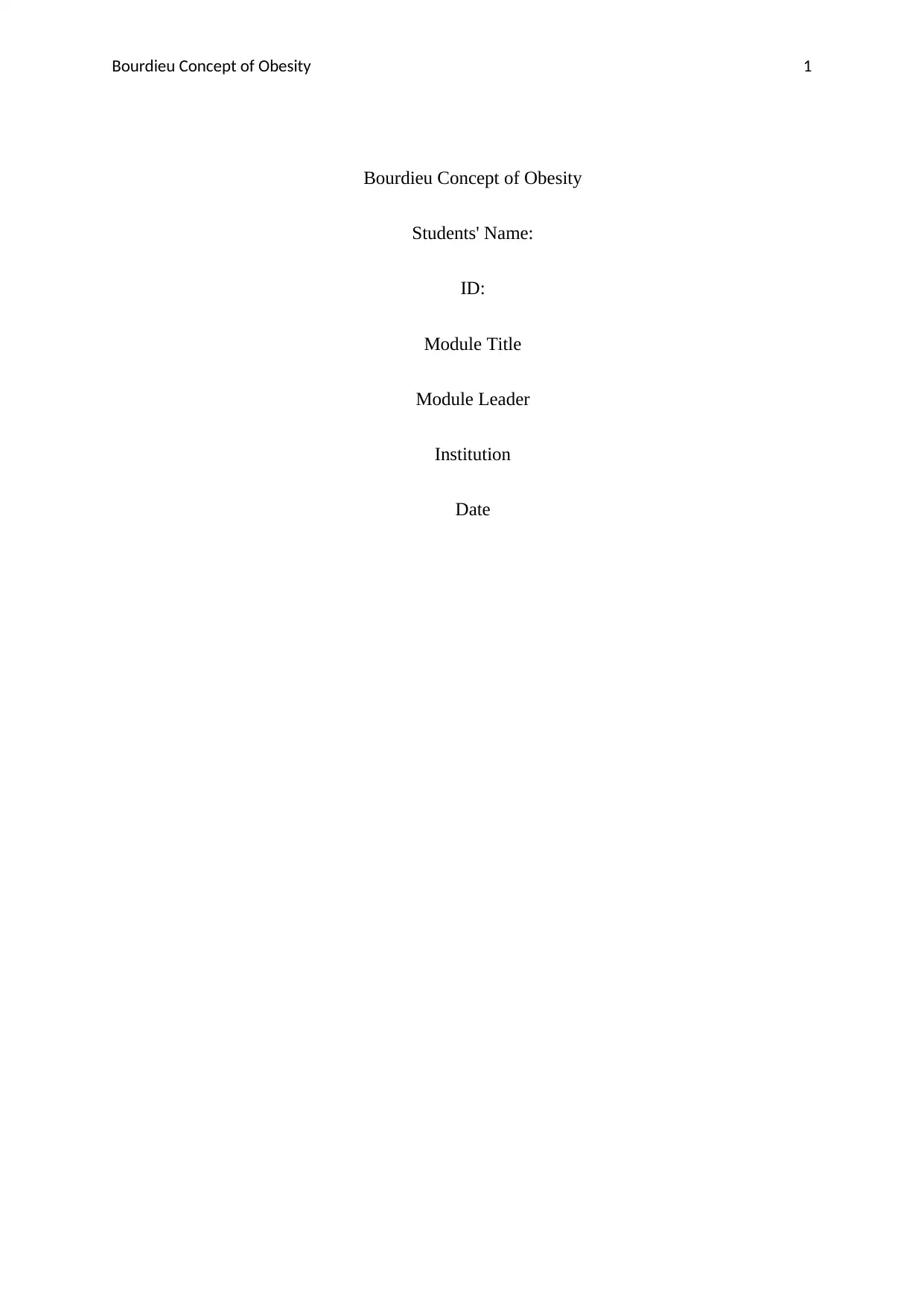
Bourdieu Concept of Obesity 1
Bourdieu Concept of Obesity
Students' Name:
ID:
Module Title
Module Leader
Institution
Date
Bourdieu Concept of Obesity
Students' Name:
ID:
Module Title
Module Leader
Institution
Date
Paraphrase This Document
Need a fresh take? Get an instant paraphrase of this document with our AI Paraphraser
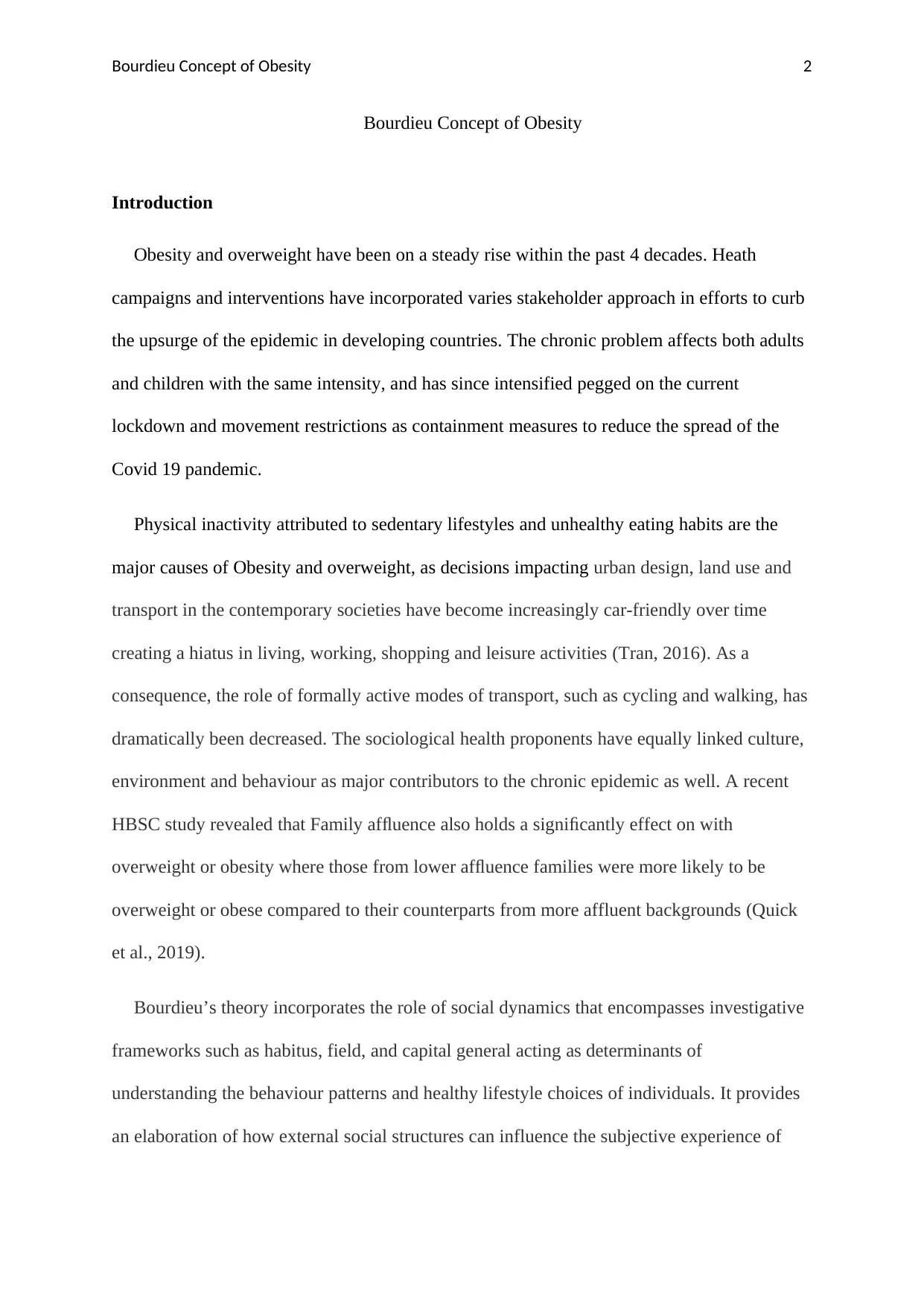
Bourdieu Concept of Obesity 2
Bourdieu Concept of Obesity
Introduction
Obesity and overweight have been on a steady rise within the past 4 decades. Heath
campaigns and interventions have incorporated varies stakeholder approach in efforts to curb
the upsurge of the epidemic in developing countries. The chronic problem affects both adults
and children with the same intensity, and has since intensified pegged on the current
lockdown and movement restrictions as containment measures to reduce the spread of the
Covid 19 pandemic.
Physical inactivity attributed to sedentary lifestyles and unhealthy eating habits are the
major causes of Obesity and overweight, as decisions impacting urban design, land use and
transport in the contemporary societies have become increasingly car-friendly over time
creating a hiatus in living, working, shopping and leisure activities (Tran, 2016). As a
consequence, the role of formally active modes of transport, such as cycling and walking, has
dramatically been decreased. The sociological health proponents have equally linked culture,
environment and behaviour as major contributors to the chronic epidemic as well. A recent
HBSC study revealed that Family affluence also holds a significantly effect on with
overweight or obesity where those from lower affluence families were more likely to be
overweight or obese compared to their counterparts from more affluent backgrounds (Quick
et al., 2019).
Bourdieu’s theory incorporates the role of social dynamics that encompasses investigative
frameworks such as habitus, field, and capital general acting as determinants of
understanding the behaviour patterns and healthy lifestyle choices of individuals. It provides
an elaboration of how external social structures can influence the subjective experience of
Bourdieu Concept of Obesity
Introduction
Obesity and overweight have been on a steady rise within the past 4 decades. Heath
campaigns and interventions have incorporated varies stakeholder approach in efforts to curb
the upsurge of the epidemic in developing countries. The chronic problem affects both adults
and children with the same intensity, and has since intensified pegged on the current
lockdown and movement restrictions as containment measures to reduce the spread of the
Covid 19 pandemic.
Physical inactivity attributed to sedentary lifestyles and unhealthy eating habits are the
major causes of Obesity and overweight, as decisions impacting urban design, land use and
transport in the contemporary societies have become increasingly car-friendly over time
creating a hiatus in living, working, shopping and leisure activities (Tran, 2016). As a
consequence, the role of formally active modes of transport, such as cycling and walking, has
dramatically been decreased. The sociological health proponents have equally linked culture,
environment and behaviour as major contributors to the chronic epidemic as well. A recent
HBSC study revealed that Family affluence also holds a significantly effect on with
overweight or obesity where those from lower affluence families were more likely to be
overweight or obese compared to their counterparts from more affluent backgrounds (Quick
et al., 2019).
Bourdieu’s theory incorporates the role of social dynamics that encompasses investigative
frameworks such as habitus, field, and capital general acting as determinants of
understanding the behaviour patterns and healthy lifestyle choices of individuals. It provides
an elaboration of how external social structures can influence the subjective experience of
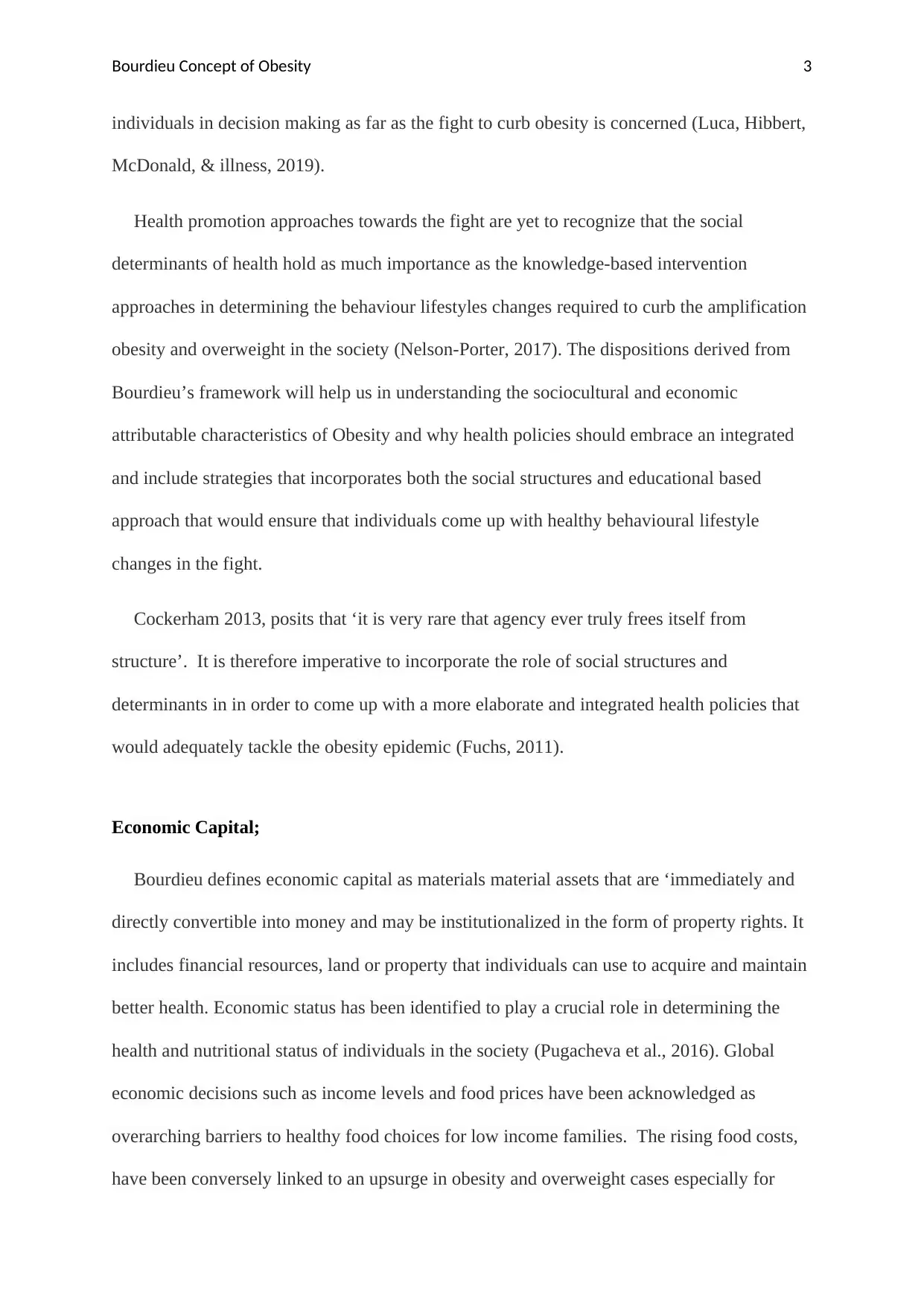
Bourdieu Concept of Obesity 3
individuals in decision making as far as the fight to curb obesity is concerned (Luca, Hibbert,
McDonald, & illness, 2019).
Health promotion approaches towards the fight are yet to recognize that the social
determinants of health hold as much importance as the knowledge-based intervention
approaches in determining the behaviour lifestyles changes required to curb the amplification
obesity and overweight in the society (Nelson-Porter, 2017). The dispositions derived from
Bourdieu’s framework will help us in understanding the sociocultural and economic
attributable characteristics of Obesity and why health policies should embrace an integrated
and include strategies that incorporates both the social structures and educational based
approach that would ensure that individuals come up with healthy behavioural lifestyle
changes in the fight.
Cockerham 2013, posits that ‘it is very rare that agency ever truly frees itself from
structure’. It is therefore imperative to incorporate the role of social structures and
determinants in in order to come up with a more elaborate and integrated health policies that
would adequately tackle the obesity epidemic (Fuchs, 2011).
Economic Capital;
Bourdieu defines economic capital as materials material assets that are ‘immediately and
directly convertible into money and may be institutionalized in the form of property rights. It
includes financial resources, land or property that individuals can use to acquire and maintain
better health. Economic status has been identified to play a crucial role in determining the
health and nutritional status of individuals in the society (Pugacheva et al., 2016). Global
economic decisions such as income levels and food prices have been acknowledged as
overarching barriers to healthy food choices for low income families. The rising food costs,
have been conversely linked to an upsurge in obesity and overweight cases especially for
individuals in decision making as far as the fight to curb obesity is concerned (Luca, Hibbert,
McDonald, & illness, 2019).
Health promotion approaches towards the fight are yet to recognize that the social
determinants of health hold as much importance as the knowledge-based intervention
approaches in determining the behaviour lifestyles changes required to curb the amplification
obesity and overweight in the society (Nelson-Porter, 2017). The dispositions derived from
Bourdieu’s framework will help us in understanding the sociocultural and economic
attributable characteristics of Obesity and why health policies should embrace an integrated
and include strategies that incorporates both the social structures and educational based
approach that would ensure that individuals come up with healthy behavioural lifestyle
changes in the fight.
Cockerham 2013, posits that ‘it is very rare that agency ever truly frees itself from
structure’. It is therefore imperative to incorporate the role of social structures and
determinants in in order to come up with a more elaborate and integrated health policies that
would adequately tackle the obesity epidemic (Fuchs, 2011).
Economic Capital;
Bourdieu defines economic capital as materials material assets that are ‘immediately and
directly convertible into money and may be institutionalized in the form of property rights. It
includes financial resources, land or property that individuals can use to acquire and maintain
better health. Economic status has been identified to play a crucial role in determining the
health and nutritional status of individuals in the society (Pugacheva et al., 2016). Global
economic decisions such as income levels and food prices have been acknowledged as
overarching barriers to healthy food choices for low income families. The rising food costs,
have been conversely linked to an upsurge in obesity and overweight cases especially for
⊘ This is a preview!⊘
Do you want full access?
Subscribe today to unlock all pages.

Trusted by 1+ million students worldwide
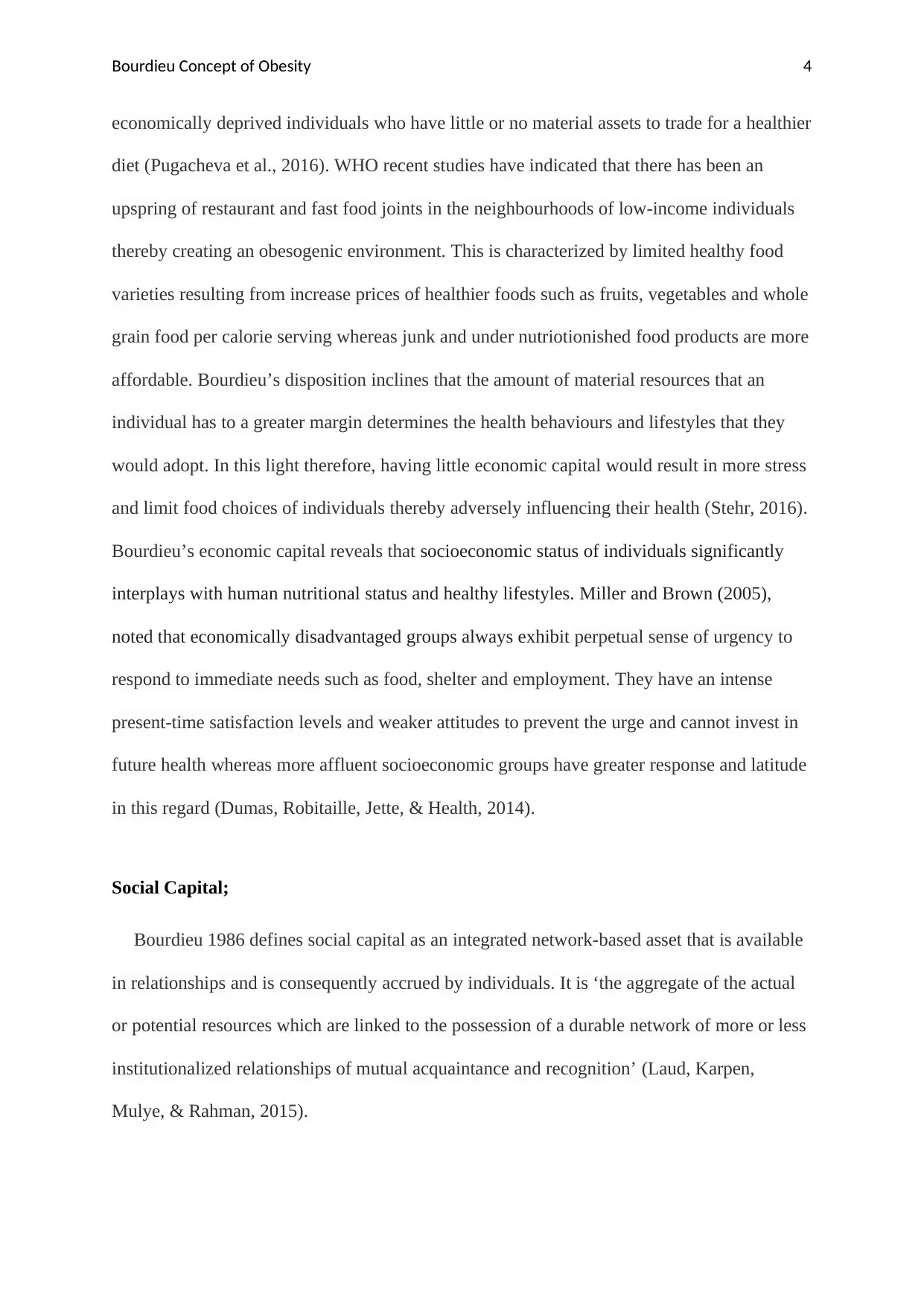
Bourdieu Concept of Obesity 4
economically deprived individuals who have little or no material assets to trade for a healthier
diet (Pugacheva et al., 2016). WHO recent studies have indicated that there has been an
upspring of restaurant and fast food joints in the neighbourhoods of low-income individuals
thereby creating an obesogenic environment. This is characterized by limited healthy food
varieties resulting from increase prices of healthier foods such as fruits, vegetables and whole
grain food per calorie serving whereas junk and under nutriotionished food products are more
affordable. Bourdieu’s disposition inclines that the amount of material resources that an
individual has to a greater margin determines the health behaviours and lifestyles that they
would adopt. In this light therefore, having little economic capital would result in more stress
and limit food choices of individuals thereby adversely influencing their health (Stehr, 2016).
Bourdieu’s economic capital reveals that socioeconomic status of individuals significantly
interplays with human nutritional status and healthy lifestyles. Miller and Brown (2005),
noted that economically disadvantaged groups always exhibit perpetual sense of urgency to
respond to immediate needs such as food, shelter and employment. They have an intense
present-time satisfaction levels and weaker attitudes to prevent the urge and cannot invest in
future health whereas more affluent socioeconomic groups have greater response and latitude
in this regard (Dumas, Robitaille, Jette, & Health, 2014).
Social Capital;
Bourdieu 1986 defines social capital as an integrated network-based asset that is available
in relationships and is consequently accrued by individuals. It is ‘the aggregate of the actual
or potential resources which are linked to the possession of a durable network of more or less
institutionalized relationships of mutual acquaintance and recognition’ (Laud, Karpen,
Mulye, & Rahman, 2015).
economically deprived individuals who have little or no material assets to trade for a healthier
diet (Pugacheva et al., 2016). WHO recent studies have indicated that there has been an
upspring of restaurant and fast food joints in the neighbourhoods of low-income individuals
thereby creating an obesogenic environment. This is characterized by limited healthy food
varieties resulting from increase prices of healthier foods such as fruits, vegetables and whole
grain food per calorie serving whereas junk and under nutriotionished food products are more
affordable. Bourdieu’s disposition inclines that the amount of material resources that an
individual has to a greater margin determines the health behaviours and lifestyles that they
would adopt. In this light therefore, having little economic capital would result in more stress
and limit food choices of individuals thereby adversely influencing their health (Stehr, 2016).
Bourdieu’s economic capital reveals that socioeconomic status of individuals significantly
interplays with human nutritional status and healthy lifestyles. Miller and Brown (2005),
noted that economically disadvantaged groups always exhibit perpetual sense of urgency to
respond to immediate needs such as food, shelter and employment. They have an intense
present-time satisfaction levels and weaker attitudes to prevent the urge and cannot invest in
future health whereas more affluent socioeconomic groups have greater response and latitude
in this regard (Dumas, Robitaille, Jette, & Health, 2014).
Social Capital;
Bourdieu 1986 defines social capital as an integrated network-based asset that is available
in relationships and is consequently accrued by individuals. It is ‘the aggregate of the actual
or potential resources which are linked to the possession of a durable network of more or less
institutionalized relationships of mutual acquaintance and recognition’ (Laud, Karpen,
Mulye, & Rahman, 2015).
Paraphrase This Document
Need a fresh take? Get an instant paraphrase of this document with our AI Paraphraser
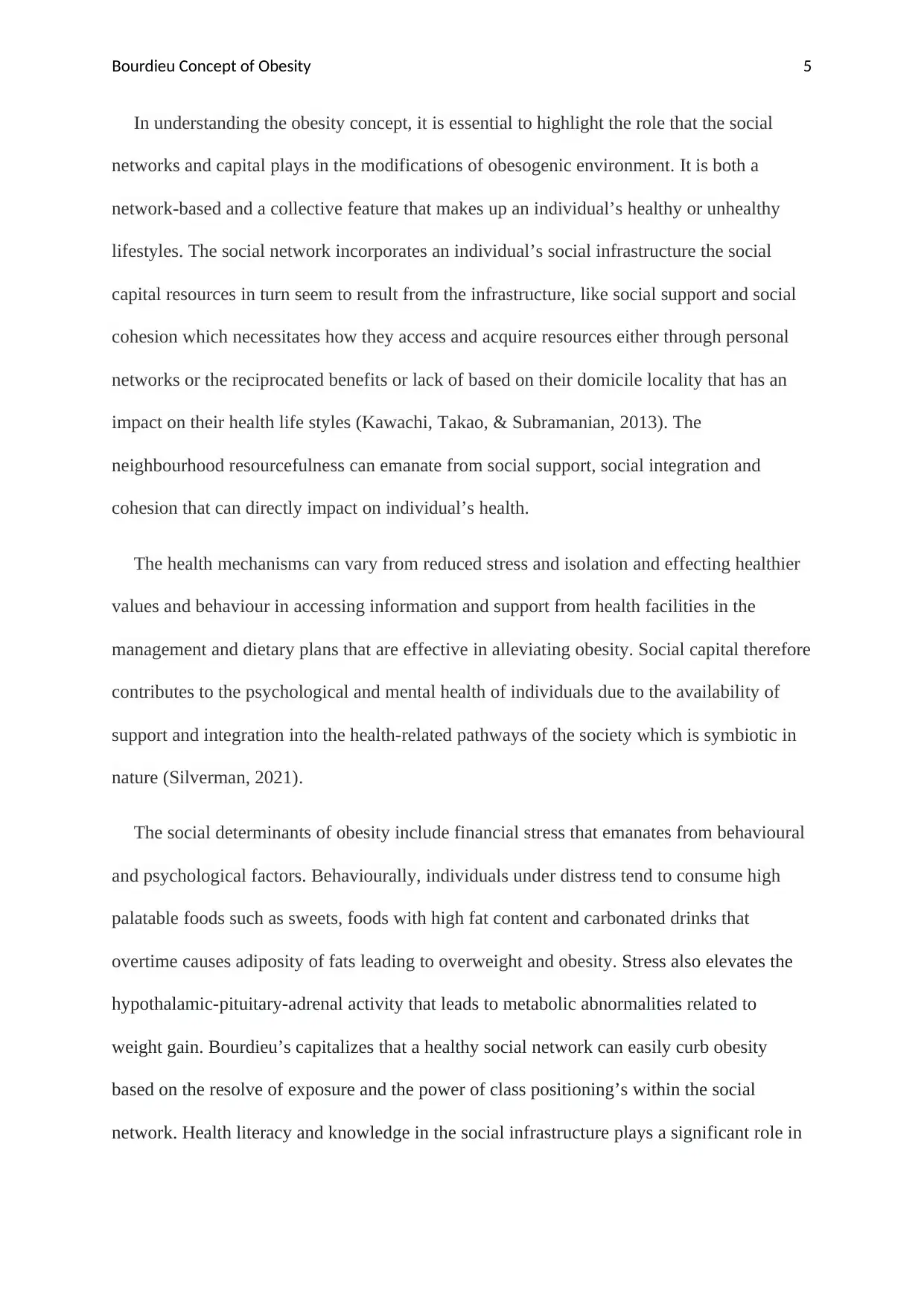
Bourdieu Concept of Obesity 5
In understanding the obesity concept, it is essential to highlight the role that the social
networks and capital plays in the modifications of obesogenic environment. It is both a
network-based and a collective feature that makes up an individual’s healthy or unhealthy
lifestyles. The social network incorporates an individual’s social infrastructure the social
capital resources in turn seem to result from the infrastructure, like social support and social
cohesion which necessitates how they access and acquire resources either through personal
networks or the reciprocated benefits or lack of based on their domicile locality that has an
impact on their health life styles (Kawachi, Takao, & Subramanian, 2013). The
neighbourhood resourcefulness can emanate from social support, social integration and
cohesion that can directly impact on individual’s health.
The health mechanisms can vary from reduced stress and isolation and effecting healthier
values and behaviour in accessing information and support from health facilities in the
management and dietary plans that are effective in alleviating obesity. Social capital therefore
contributes to the psychological and mental health of individuals due to the availability of
support and integration into the health-related pathways of the society which is symbiotic in
nature (Silverman, 2021).
The social determinants of obesity include financial stress that emanates from behavioural
and psychological factors. Behaviourally, individuals under distress tend to consume high
palatable foods such as sweets, foods with high fat content and carbonated drinks that
overtime causes adiposity of fats leading to overweight and obesity. Stress also elevates the
hypothalamic-pituitary-adrenal activity that leads to metabolic abnormalities related to
weight gain. Bourdieu’s capitalizes that a healthy social network can easily curb obesity
based on the resolve of exposure and the power of class positioning’s within the social
network. Health literacy and knowledge in the social infrastructure plays a significant role in
In understanding the obesity concept, it is essential to highlight the role that the social
networks and capital plays in the modifications of obesogenic environment. It is both a
network-based and a collective feature that makes up an individual’s healthy or unhealthy
lifestyles. The social network incorporates an individual’s social infrastructure the social
capital resources in turn seem to result from the infrastructure, like social support and social
cohesion which necessitates how they access and acquire resources either through personal
networks or the reciprocated benefits or lack of based on their domicile locality that has an
impact on their health life styles (Kawachi, Takao, & Subramanian, 2013). The
neighbourhood resourcefulness can emanate from social support, social integration and
cohesion that can directly impact on individual’s health.
The health mechanisms can vary from reduced stress and isolation and effecting healthier
values and behaviour in accessing information and support from health facilities in the
management and dietary plans that are effective in alleviating obesity. Social capital therefore
contributes to the psychological and mental health of individuals due to the availability of
support and integration into the health-related pathways of the society which is symbiotic in
nature (Silverman, 2021).
The social determinants of obesity include financial stress that emanates from behavioural
and psychological factors. Behaviourally, individuals under distress tend to consume high
palatable foods such as sweets, foods with high fat content and carbonated drinks that
overtime causes adiposity of fats leading to overweight and obesity. Stress also elevates the
hypothalamic-pituitary-adrenal activity that leads to metabolic abnormalities related to
weight gain. Bourdieu’s capitalizes that a healthy social network can easily curb obesity
based on the resolve of exposure and the power of class positioning’s within the social
network. Health literacy and knowledge in the social infrastructure plays a significant role in
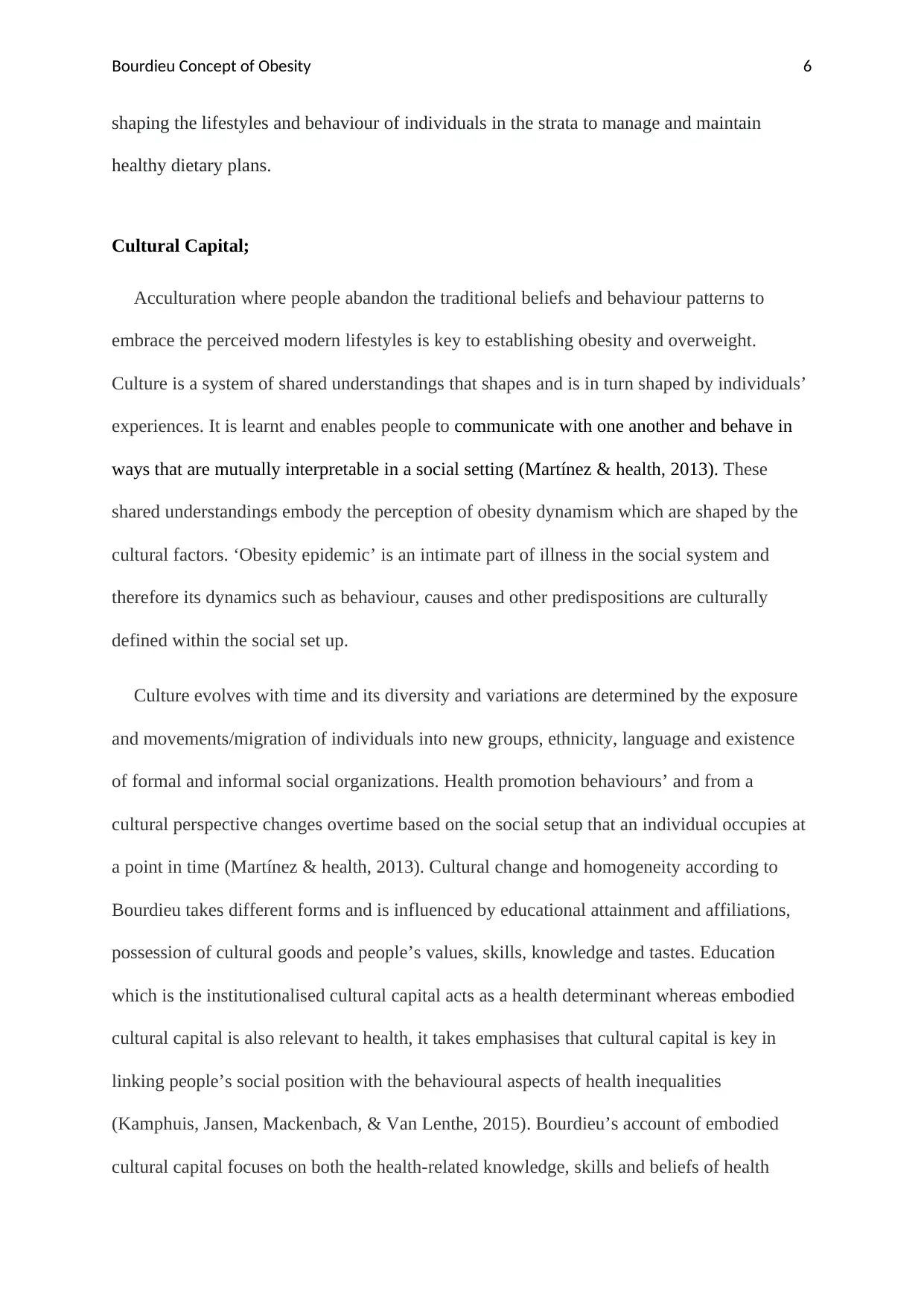
Bourdieu Concept of Obesity 6
shaping the lifestyles and behaviour of individuals in the strata to manage and maintain
healthy dietary plans.
Cultural Capital;
Acculturation where people abandon the traditional beliefs and behaviour patterns to
embrace the perceived modern lifestyles is key to establishing obesity and overweight.
Culture is a system of shared understandings that shapes and is in turn shaped by individuals’
experiences. It is learnt and enables people to communicate with one another and behave in
ways that are mutually interpretable in a social setting (Martínez & health, 2013). These
shared understandings embody the perception of obesity dynamism which are shaped by the
cultural factors. ‘Obesity epidemic’ is an intimate part of illness in the social system and
therefore its dynamics such as behaviour, causes and other predispositions are culturally
defined within the social set up.
Culture evolves with time and its diversity and variations are determined by the exposure
and movements/migration of individuals into new groups, ethnicity, language and existence
of formal and informal social organizations. Health promotion behaviours’ and from a
cultural perspective changes overtime based on the social setup that an individual occupies at
a point in time (Martínez & health, 2013). Cultural change and homogeneity according to
Bourdieu takes different forms and is influenced by educational attainment and affiliations,
possession of cultural goods and people’s values, skills, knowledge and tastes. Education
which is the institutionalised cultural capital acts as a health determinant whereas embodied
cultural capital is also relevant to health, it takes emphasises that cultural capital is key in
linking people’s social position with the behavioural aspects of health inequalities
(Kamphuis, Jansen, Mackenbach, & Van Lenthe, 2015). Bourdieu’s account of embodied
cultural capital focuses on both the health-related knowledge, skills and beliefs of health
shaping the lifestyles and behaviour of individuals in the strata to manage and maintain
healthy dietary plans.
Cultural Capital;
Acculturation where people abandon the traditional beliefs and behaviour patterns to
embrace the perceived modern lifestyles is key to establishing obesity and overweight.
Culture is a system of shared understandings that shapes and is in turn shaped by individuals’
experiences. It is learnt and enables people to communicate with one another and behave in
ways that are mutually interpretable in a social setting (Martínez & health, 2013). These
shared understandings embody the perception of obesity dynamism which are shaped by the
cultural factors. ‘Obesity epidemic’ is an intimate part of illness in the social system and
therefore its dynamics such as behaviour, causes and other predispositions are culturally
defined within the social set up.
Culture evolves with time and its diversity and variations are determined by the exposure
and movements/migration of individuals into new groups, ethnicity, language and existence
of formal and informal social organizations. Health promotion behaviours’ and from a
cultural perspective changes overtime based on the social setup that an individual occupies at
a point in time (Martínez & health, 2013). Cultural change and homogeneity according to
Bourdieu takes different forms and is influenced by educational attainment and affiliations,
possession of cultural goods and people’s values, skills, knowledge and tastes. Education
which is the institutionalised cultural capital acts as a health determinant whereas embodied
cultural capital is also relevant to health, it takes emphasises that cultural capital is key in
linking people’s social position with the behavioural aspects of health inequalities
(Kamphuis, Jansen, Mackenbach, & Van Lenthe, 2015). Bourdieu’s account of embodied
cultural capital focuses on both the health-related knowledge, skills and beliefs of health
⊘ This is a preview!⊘
Do you want full access?
Subscribe today to unlock all pages.

Trusted by 1+ million students worldwide
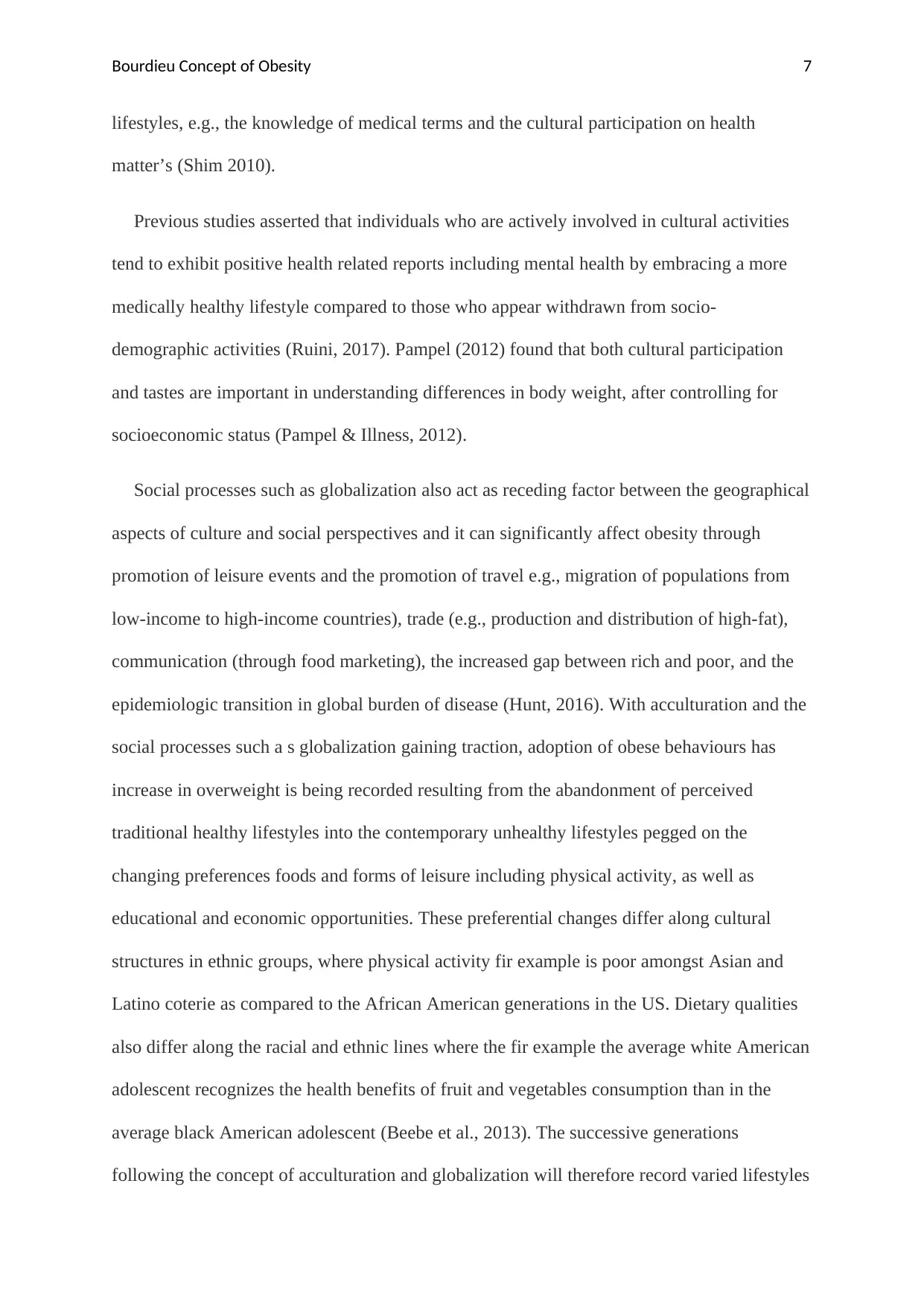
Bourdieu Concept of Obesity 7
lifestyles, e.g., the knowledge of medical terms and the cultural participation on health
matter’s (Shim 2010).
Previous studies asserted that individuals who are actively involved in cultural activities
tend to exhibit positive health related reports including mental health by embracing a more
medically healthy lifestyle compared to those who appear withdrawn from socio-
demographic activities (Ruini, 2017). Pampel (2012) found that both cultural participation
and tastes are important in understanding differences in body weight, after controlling for
socioeconomic status (Pampel & Illness, 2012).
Social processes such as globalization also act as receding factor between the geographical
aspects of culture and social perspectives and it can significantly affect obesity through
promotion of leisure events and the promotion of travel e.g., migration of populations from
low-income to high-income countries), trade (e.g., production and distribution of high-fat),
communication (through food marketing), the increased gap between rich and poor, and the
epidemiologic transition in global burden of disease (Hunt, 2016). With acculturation and the
social processes such a s globalization gaining traction, adoption of obese behaviours has
increase in overweight is being recorded resulting from the abandonment of perceived
traditional healthy lifestyles into the contemporary unhealthy lifestyles pegged on the
changing preferences foods and forms of leisure including physical activity, as well as
educational and economic opportunities. These preferential changes differ along cultural
structures in ethnic groups, where physical activity fir example is poor amongst Asian and
Latino coterie as compared to the African American generations in the US. Dietary qualities
also differ along the racial and ethnic lines where the fir example the average white American
adolescent recognizes the health benefits of fruit and vegetables consumption than in the
average black American adolescent (Beebe et al., 2013). The successive generations
following the concept of acculturation and globalization will therefore record varied lifestyles
lifestyles, e.g., the knowledge of medical terms and the cultural participation on health
matter’s (Shim 2010).
Previous studies asserted that individuals who are actively involved in cultural activities
tend to exhibit positive health related reports including mental health by embracing a more
medically healthy lifestyle compared to those who appear withdrawn from socio-
demographic activities (Ruini, 2017). Pampel (2012) found that both cultural participation
and tastes are important in understanding differences in body weight, after controlling for
socioeconomic status (Pampel & Illness, 2012).
Social processes such as globalization also act as receding factor between the geographical
aspects of culture and social perspectives and it can significantly affect obesity through
promotion of leisure events and the promotion of travel e.g., migration of populations from
low-income to high-income countries), trade (e.g., production and distribution of high-fat),
communication (through food marketing), the increased gap between rich and poor, and the
epidemiologic transition in global burden of disease (Hunt, 2016). With acculturation and the
social processes such a s globalization gaining traction, adoption of obese behaviours has
increase in overweight is being recorded resulting from the abandonment of perceived
traditional healthy lifestyles into the contemporary unhealthy lifestyles pegged on the
changing preferences foods and forms of leisure including physical activity, as well as
educational and economic opportunities. These preferential changes differ along cultural
structures in ethnic groups, where physical activity fir example is poor amongst Asian and
Latino coterie as compared to the African American generations in the US. Dietary qualities
also differ along the racial and ethnic lines where the fir example the average white American
adolescent recognizes the health benefits of fruit and vegetables consumption than in the
average black American adolescent (Beebe et al., 2013). The successive generations
following the concept of acculturation and globalization will therefore record varied lifestyles
Paraphrase This Document
Need a fresh take? Get an instant paraphrase of this document with our AI Paraphraser
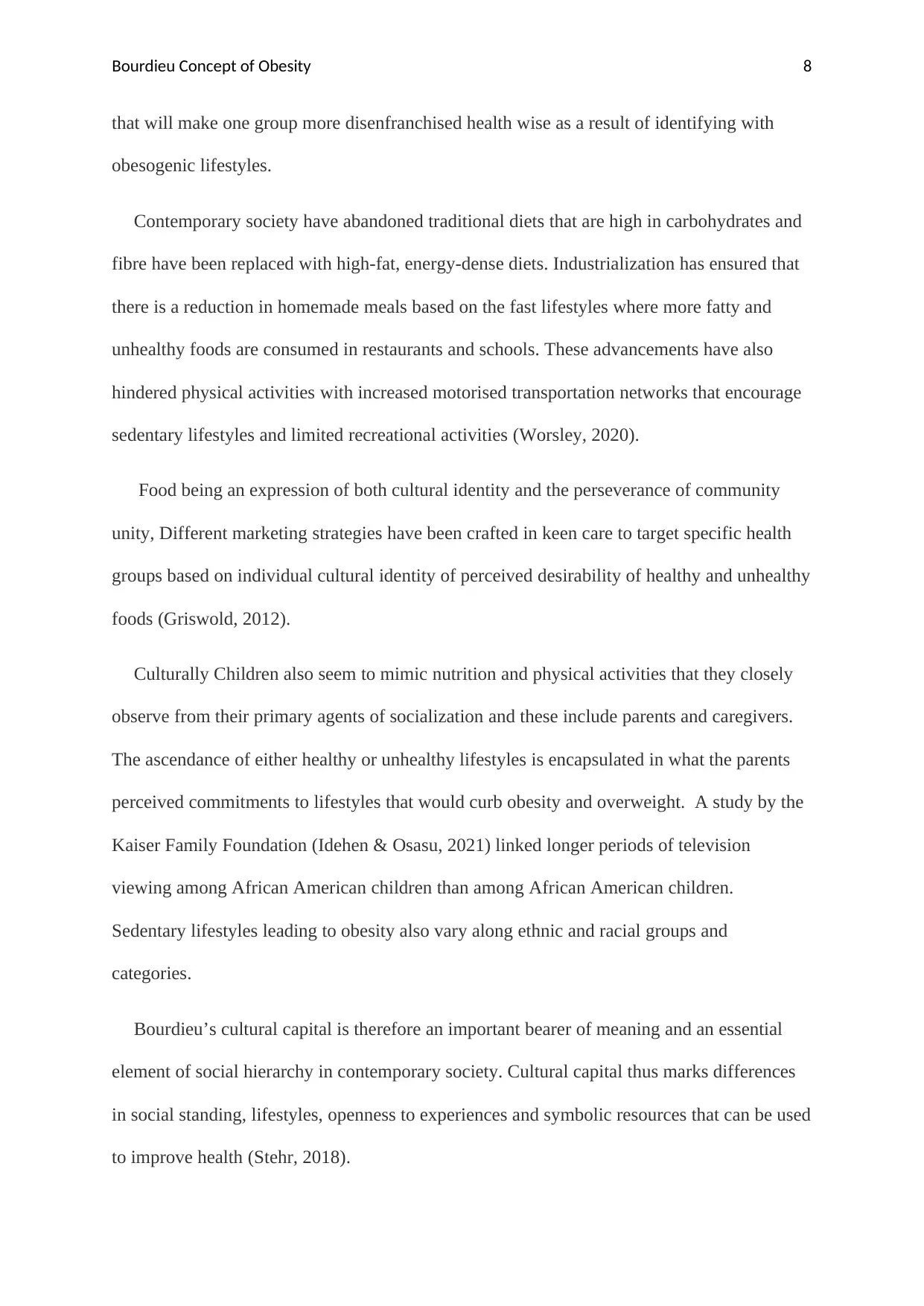
Bourdieu Concept of Obesity 8
that will make one group more disenfranchised health wise as a result of identifying with
obesogenic lifestyles.
Contemporary society have abandoned traditional diets that are high in carbohydrates and
fibre have been replaced with high-fat, energy-dense diets. Industrialization has ensured that
there is a reduction in homemade meals based on the fast lifestyles where more fatty and
unhealthy foods are consumed in restaurants and schools. These advancements have also
hindered physical activities with increased motorised transportation networks that encourage
sedentary lifestyles and limited recreational activities (Worsley, 2020).
Food being an expression of both cultural identity and the perseverance of community
unity, Different marketing strategies have been crafted in keen care to target specific health
groups based on individual cultural identity of perceived desirability of healthy and unhealthy
foods (Griswold, 2012).
Culturally Children also seem to mimic nutrition and physical activities that they closely
observe from their primary agents of socialization and these include parents and caregivers.
The ascendance of either healthy or unhealthy lifestyles is encapsulated in what the parents
perceived commitments to lifestyles that would curb obesity and overweight. A study by the
Kaiser Family Foundation (Idehen & Osasu, 2021) linked longer periods of television
viewing among African American children than among African American children.
Sedentary lifestyles leading to obesity also vary along ethnic and racial groups and
categories.
Bourdieu’s cultural capital is therefore an important bearer of meaning and an essential
element of social hierarchy in contemporary society. Cultural capital thus marks differences
in social standing, lifestyles, openness to experiences and symbolic resources that can be used
to improve health (Stehr, 2018).
that will make one group more disenfranchised health wise as a result of identifying with
obesogenic lifestyles.
Contemporary society have abandoned traditional diets that are high in carbohydrates and
fibre have been replaced with high-fat, energy-dense diets. Industrialization has ensured that
there is a reduction in homemade meals based on the fast lifestyles where more fatty and
unhealthy foods are consumed in restaurants and schools. These advancements have also
hindered physical activities with increased motorised transportation networks that encourage
sedentary lifestyles and limited recreational activities (Worsley, 2020).
Food being an expression of both cultural identity and the perseverance of community
unity, Different marketing strategies have been crafted in keen care to target specific health
groups based on individual cultural identity of perceived desirability of healthy and unhealthy
foods (Griswold, 2012).
Culturally Children also seem to mimic nutrition and physical activities that they closely
observe from their primary agents of socialization and these include parents and caregivers.
The ascendance of either healthy or unhealthy lifestyles is encapsulated in what the parents
perceived commitments to lifestyles that would curb obesity and overweight. A study by the
Kaiser Family Foundation (Idehen & Osasu, 2021) linked longer periods of television
viewing among African American children than among African American children.
Sedentary lifestyles leading to obesity also vary along ethnic and racial groups and
categories.
Bourdieu’s cultural capital is therefore an important bearer of meaning and an essential
element of social hierarchy in contemporary society. Cultural capital thus marks differences
in social standing, lifestyles, openness to experiences and symbolic resources that can be used
to improve health (Stehr, 2018).
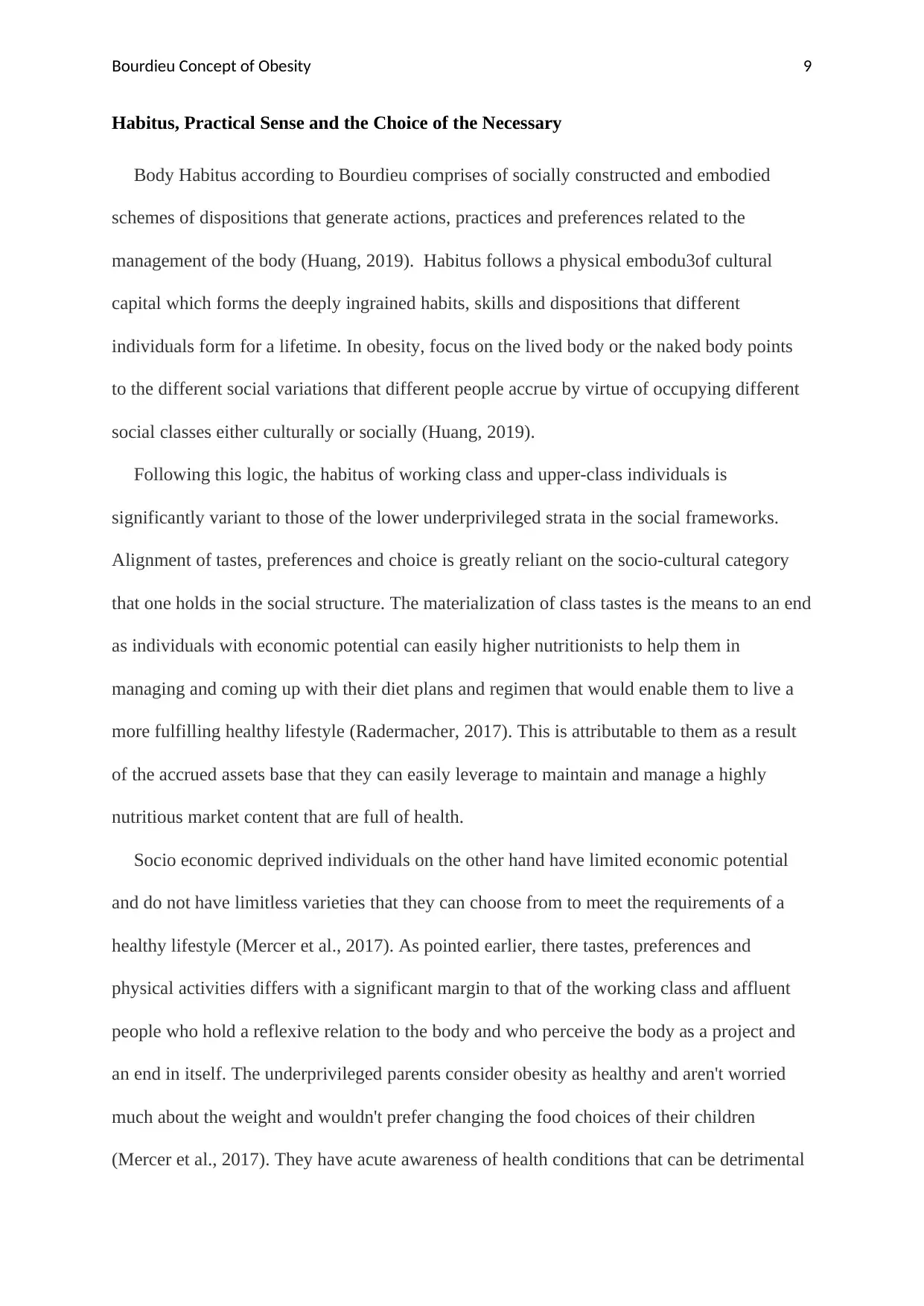
Bourdieu Concept of Obesity 9
Habitus, Practical Sense and the Choice of the Necessary
Body Habitus according to Bourdieu comprises of socially constructed and embodied
schemes of dispositions that generate actions, practices and preferences related to the
management of the body (Huang, 2019). Habitus follows a physical embodu3of cultural
capital which forms the deeply ingrained habits, skills and dispositions that different
individuals form for a lifetime. In obesity, focus on the lived body or the naked body points
to the different social variations that different people accrue by virtue of occupying different
social classes either culturally or socially (Huang, 2019).
Following this logic, the habitus of working class and upper-class individuals is
significantly variant to those of the lower underprivileged strata in the social frameworks.
Alignment of tastes, preferences and choice is greatly reliant on the socio-cultural category
that one holds in the social structure. The materialization of class tastes is the means to an end
as individuals with economic potential can easily higher nutritionists to help them in
managing and coming up with their diet plans and regimen that would enable them to live a
more fulfilling healthy lifestyle (Radermacher, 2017). This is attributable to them as a result
of the accrued assets base that they can easily leverage to maintain and manage a highly
nutritious market content that are full of health.
Socio economic deprived individuals on the other hand have limited economic potential
and do not have limitless varieties that they can choose from to meet the requirements of a
healthy lifestyle (Mercer et al., 2017). As pointed earlier, there tastes, preferences and
physical activities differs with a significant margin to that of the working class and affluent
people who hold a reflexive relation to the body and who perceive the body as a project and
an end in itself. The underprivileged parents consider obesity as healthy and aren't worried
much about the weight and wouldn't prefer changing the food choices of their children
(Mercer et al., 2017). They have acute awareness of health conditions that can be detrimental
Habitus, Practical Sense and the Choice of the Necessary
Body Habitus according to Bourdieu comprises of socially constructed and embodied
schemes of dispositions that generate actions, practices and preferences related to the
management of the body (Huang, 2019). Habitus follows a physical embodu3of cultural
capital which forms the deeply ingrained habits, skills and dispositions that different
individuals form for a lifetime. In obesity, focus on the lived body or the naked body points
to the different social variations that different people accrue by virtue of occupying different
social classes either culturally or socially (Huang, 2019).
Following this logic, the habitus of working class and upper-class individuals is
significantly variant to those of the lower underprivileged strata in the social frameworks.
Alignment of tastes, preferences and choice is greatly reliant on the socio-cultural category
that one holds in the social structure. The materialization of class tastes is the means to an end
as individuals with economic potential can easily higher nutritionists to help them in
managing and coming up with their diet plans and regimen that would enable them to live a
more fulfilling healthy lifestyle (Radermacher, 2017). This is attributable to them as a result
of the accrued assets base that they can easily leverage to maintain and manage a highly
nutritious market content that are full of health.
Socio economic deprived individuals on the other hand have limited economic potential
and do not have limitless varieties that they can choose from to meet the requirements of a
healthy lifestyle (Mercer et al., 2017). As pointed earlier, there tastes, preferences and
physical activities differs with a significant margin to that of the working class and affluent
people who hold a reflexive relation to the body and who perceive the body as a project and
an end in itself. The underprivileged parents consider obesity as healthy and aren't worried
much about the weight and wouldn't prefer changing the food choices of their children
(Mercer et al., 2017). They have acute awareness of health conditions that can be detrimental
⊘ This is a preview!⊘
Do you want full access?
Subscribe today to unlock all pages.

Trusted by 1+ million students worldwide
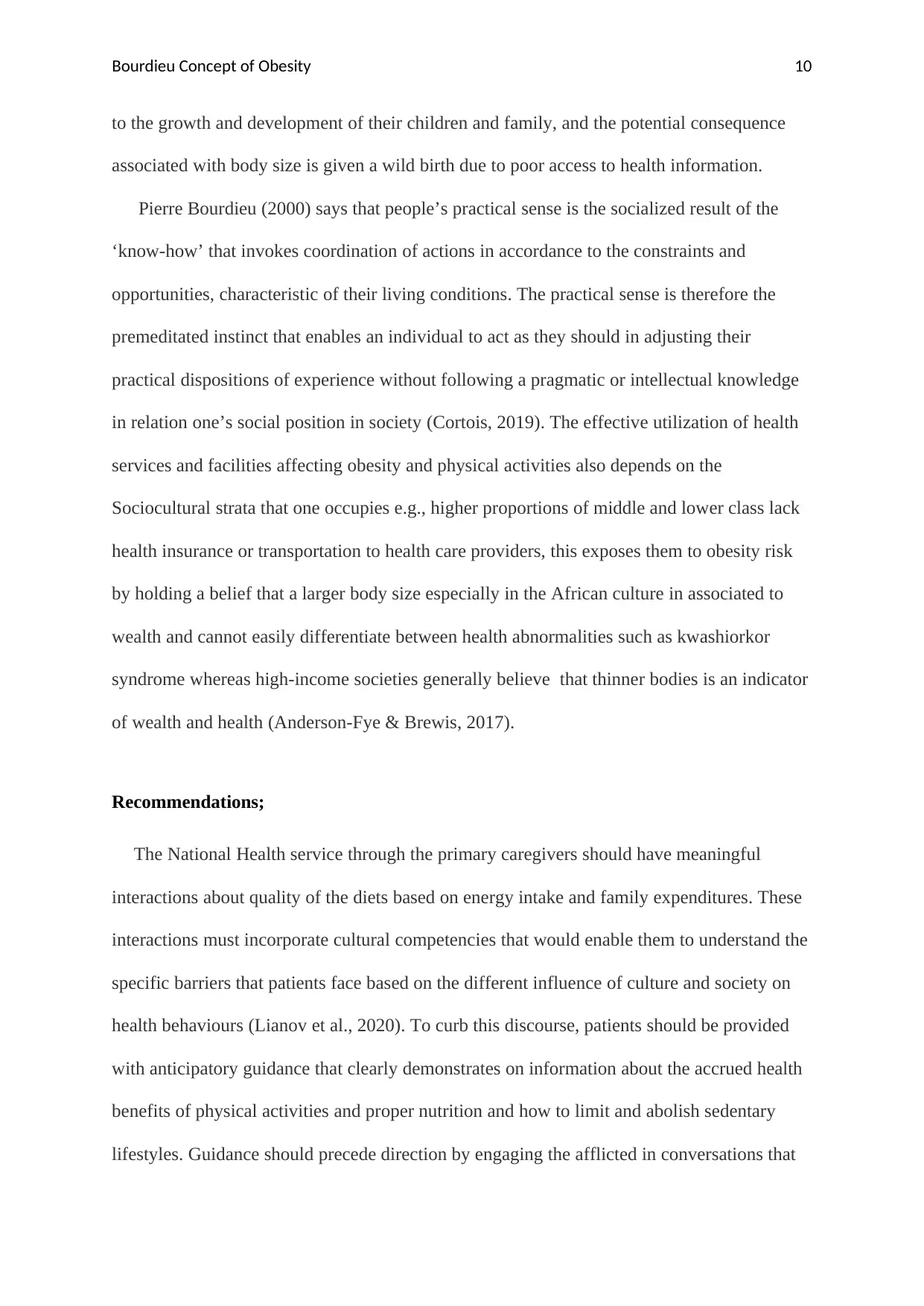
Bourdieu Concept of Obesity 10
to the growth and development of their children and family, and the potential consequence
associated with body size is given a wild birth due to poor access to health information.
Pierre Bourdieu (2000) says that people’s practical sense is the socialized result of the
‘know-how’ that invokes coordination of actions in accordance to the constraints and
opportunities, characteristic of their living conditions. The practical sense is therefore the
premeditated instinct that enables an individual to act as they should in adjusting their
practical dispositions of experience without following a pragmatic or intellectual knowledge
in relation one’s social position in society (Cortois, 2019). The effective utilization of health
services and facilities affecting obesity and physical activities also depends on the
Sociocultural strata that one occupies e.g., higher proportions of middle and lower class lack
health insurance or transportation to health care providers, this exposes them to obesity risk
by holding a belief that a larger body size especially in the African culture in associated to
wealth and cannot easily differentiate between health abnormalities such as kwashiorkor
syndrome whereas high-income societies generally believe that thinner bodies is an indicator
of wealth and health (Anderson-Fye & Brewis, 2017).
Recommendations;
The National Health service through the primary caregivers should have meaningful
interactions about quality of the diets based on energy intake and family expenditures. These
interactions must incorporate cultural competencies that would enable them to understand the
specific barriers that patients face based on the different influence of culture and society on
health behaviours (Lianov et al., 2020). To curb this discourse, patients should be provided
with anticipatory guidance that clearly demonstrates on information about the accrued health
benefits of physical activities and proper nutrition and how to limit and abolish sedentary
lifestyles. Guidance should precede direction by engaging the afflicted in conversations that
to the growth and development of their children and family, and the potential consequence
associated with body size is given a wild birth due to poor access to health information.
Pierre Bourdieu (2000) says that people’s practical sense is the socialized result of the
‘know-how’ that invokes coordination of actions in accordance to the constraints and
opportunities, characteristic of their living conditions. The practical sense is therefore the
premeditated instinct that enables an individual to act as they should in adjusting their
practical dispositions of experience without following a pragmatic or intellectual knowledge
in relation one’s social position in society (Cortois, 2019). The effective utilization of health
services and facilities affecting obesity and physical activities also depends on the
Sociocultural strata that one occupies e.g., higher proportions of middle and lower class lack
health insurance or transportation to health care providers, this exposes them to obesity risk
by holding a belief that a larger body size especially in the African culture in associated to
wealth and cannot easily differentiate between health abnormalities such as kwashiorkor
syndrome whereas high-income societies generally believe that thinner bodies is an indicator
of wealth and health (Anderson-Fye & Brewis, 2017).
Recommendations;
The National Health service through the primary caregivers should have meaningful
interactions about quality of the diets based on energy intake and family expenditures. These
interactions must incorporate cultural competencies that would enable them to understand the
specific barriers that patients face based on the different influence of culture and society on
health behaviours (Lianov et al., 2020). To curb this discourse, patients should be provided
with anticipatory guidance that clearly demonstrates on information about the accrued health
benefits of physical activities and proper nutrition and how to limit and abolish sedentary
lifestyles. Guidance should precede direction by engaging the afflicted in conversations that
Paraphrase This Document
Need a fresh take? Get an instant paraphrase of this document with our AI Paraphraser
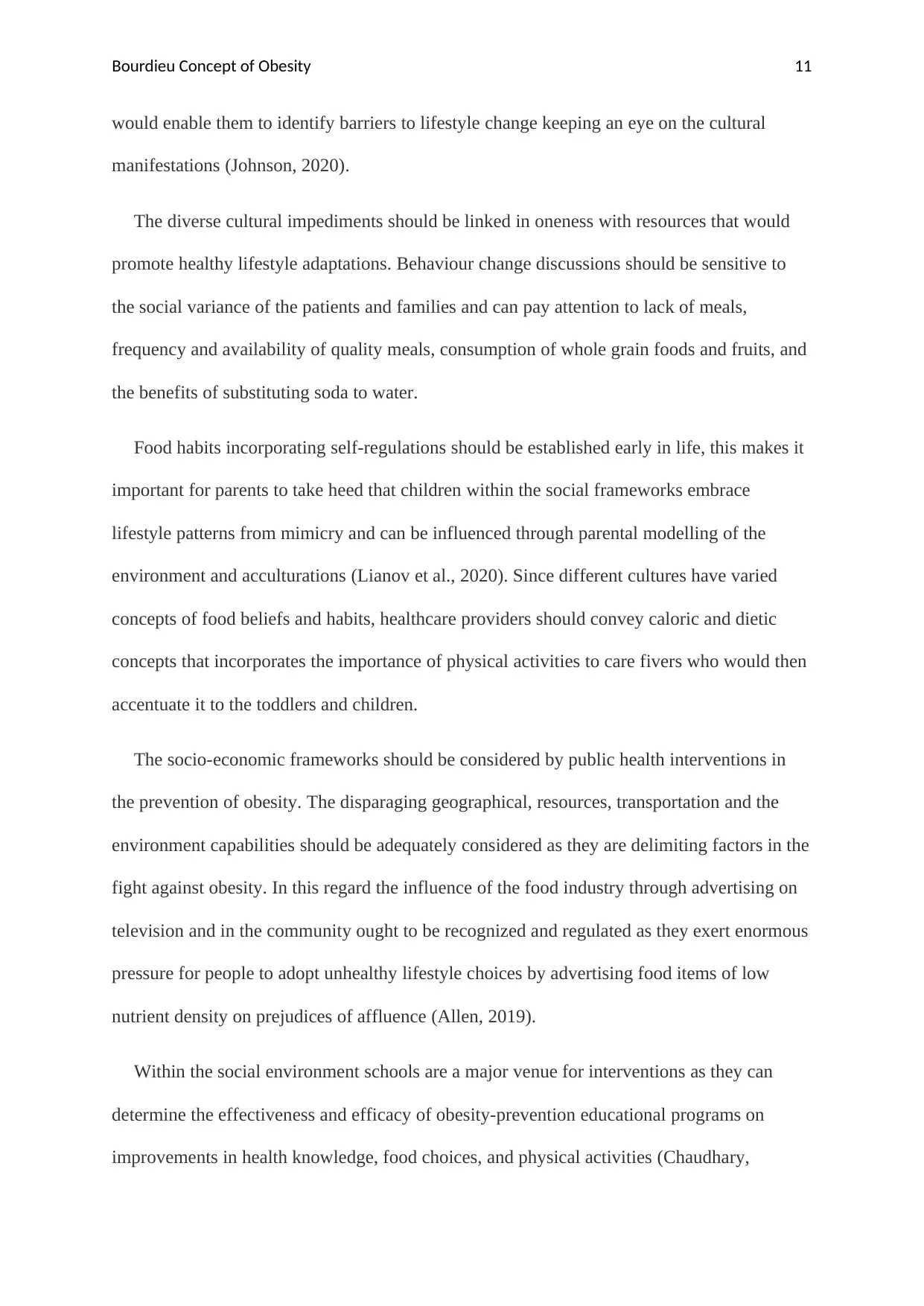
Bourdieu Concept of Obesity 11
would enable them to identify barriers to lifestyle change keeping an eye on the cultural
manifestations (Johnson, 2020).
The diverse cultural impediments should be linked in oneness with resources that would
promote healthy lifestyle adaptations. Behaviour change discussions should be sensitive to
the social variance of the patients and families and can pay attention to lack of meals,
frequency and availability of quality meals, consumption of whole grain foods and fruits, and
the benefits of substituting soda to water.
Food habits incorporating self-regulations should be established early in life, this makes it
important for parents to take heed that children within the social frameworks embrace
lifestyle patterns from mimicry and can be influenced through parental modelling of the
environment and acculturations (Lianov et al., 2020). Since different cultures have varied
concepts of food beliefs and habits, healthcare providers should convey caloric and dietic
concepts that incorporates the importance of physical activities to care fivers who would then
accentuate it to the toddlers and children.
The socio-economic frameworks should be considered by public health interventions in
the prevention of obesity. The disparaging geographical, resources, transportation and the
environment capabilities should be adequately considered as they are delimiting factors in the
fight against obesity. In this regard the influence of the food industry through advertising on
television and in the community ought to be recognized and regulated as they exert enormous
pressure for people to adopt unhealthy lifestyle choices by advertising food items of low
nutrient density on prejudices of affluence (Allen, 2019).
Within the social environment schools are a major venue for interventions as they can
determine the effectiveness and efficacy of obesity-prevention educational programs on
improvements in health knowledge, food choices, and physical activities (Chaudhary,
would enable them to identify barriers to lifestyle change keeping an eye on the cultural
manifestations (Johnson, 2020).
The diverse cultural impediments should be linked in oneness with resources that would
promote healthy lifestyle adaptations. Behaviour change discussions should be sensitive to
the social variance of the patients and families and can pay attention to lack of meals,
frequency and availability of quality meals, consumption of whole grain foods and fruits, and
the benefits of substituting soda to water.
Food habits incorporating self-regulations should be established early in life, this makes it
important for parents to take heed that children within the social frameworks embrace
lifestyle patterns from mimicry and can be influenced through parental modelling of the
environment and acculturations (Lianov et al., 2020). Since different cultures have varied
concepts of food beliefs and habits, healthcare providers should convey caloric and dietic
concepts that incorporates the importance of physical activities to care fivers who would then
accentuate it to the toddlers and children.
The socio-economic frameworks should be considered by public health interventions in
the prevention of obesity. The disparaging geographical, resources, transportation and the
environment capabilities should be adequately considered as they are delimiting factors in the
fight against obesity. In this regard the influence of the food industry through advertising on
television and in the community ought to be recognized and regulated as they exert enormous
pressure for people to adopt unhealthy lifestyle choices by advertising food items of low
nutrient density on prejudices of affluence (Allen, 2019).
Within the social environment schools are a major venue for interventions as they can
determine the effectiveness and efficacy of obesity-prevention educational programs on
improvements in health knowledge, food choices, and physical activities (Chaudhary,
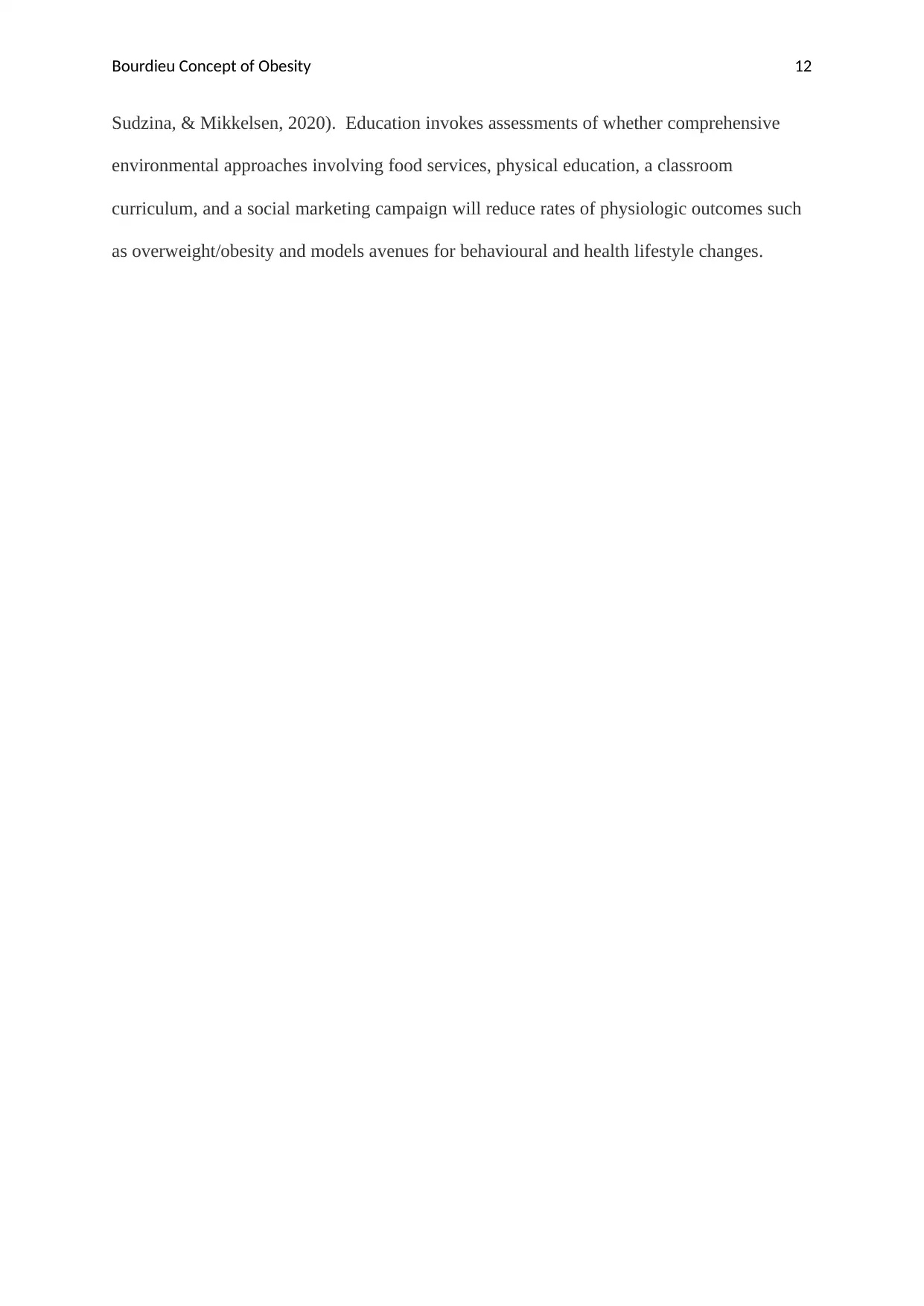
Bourdieu Concept of Obesity 12
Sudzina, & Mikkelsen, 2020). Education invokes assessments of whether comprehensive
environmental approaches involving food services, physical education, a classroom
curriculum, and a social marketing campaign will reduce rates of physiologic outcomes such
as overweight/obesity and models avenues for behavioural and health lifestyle changes.
Sudzina, & Mikkelsen, 2020). Education invokes assessments of whether comprehensive
environmental approaches involving food services, physical education, a classroom
curriculum, and a social marketing campaign will reduce rates of physiologic outcomes such
as overweight/obesity and models avenues for behavioural and health lifestyle changes.
⊘ This is a preview!⊘
Do you want full access?
Subscribe today to unlock all pages.

Trusted by 1+ million students worldwide
1 out of 15
Related Documents
Your All-in-One AI-Powered Toolkit for Academic Success.
+13062052269
info@desklib.com
Available 24*7 on WhatsApp / Email
![[object Object]](/_next/static/media/star-bottom.7253800d.svg)
Unlock your academic potential
Copyright © 2020–2026 A2Z Services. All Rights Reserved. Developed and managed by ZUCOL.



